Finding Lost Voices: A Woman for President, the 1872 Presidential Candidacy of Victoria Claflin Woodhull
A weekly email that brings back the voices of those who have been forgotten or misremembered.
These days, the news has been buzzing with headlines about Kamala Harris’s presidential run, so I thought I would take us back to the first woman to run for president in the United States. No, not Hilary Clinton. The first woman to run for president was much further back, during the presidential election of 1872, to be exact. Who ran in that election? A woman named Victoria Woodhull (1838-1927). Woodhull was a suffragist who ran on the suffragist ticket. I first came across her life and ideas while researching my book on Charmian Kittredge London. Charmian and her Aunt and Uncle attended the First Congregational Church in Oakland when they lived at 554 Thirty-Fifth Street in Oakland in the 1880s. In his sermons, Dr. John Knox McLean inspired his audience to explore and appreciate Victoria Woodhull's belief that women deserved autonomy over their sexuality. As she wrote,
“I have an unalienable right, constitutional and natural right to love whom I may, to love as long or short a period as I can; to change that love everyday if I please, and with that right neither you nor any law can frame have any right to interfere.”
So, where did this forward-thinking woman come from, and why have you never heard of her? Victoria Woodhull was born in Homer, Ohio. Her upbringing was anything but conventional. She only received three years of schooling before her family had to flee Homer because her father had been caught burning down their mill for the insurance payout. When her family hit the road, they began telling fortunes and selling medicinal cures they made themselves.
When she was fifteen, Woodhull wanted to escape, so she married a 28-year-old doctor named Canning Woodhull. Soon after marrying, she had two children whom she had to raise on her own because her husband was an alcoholic who often had affairs and who was rarely home. Woodhull took up various odd jobs to support her family, but none paid enough to support them. So, when she found out her younger sister, Tennessee Claflin, had set out on her own as a traveling fortune teller and healer, Woodhull divorced her husband and joined her sister, working as a “medical clairvoyant” who could cure the sick.
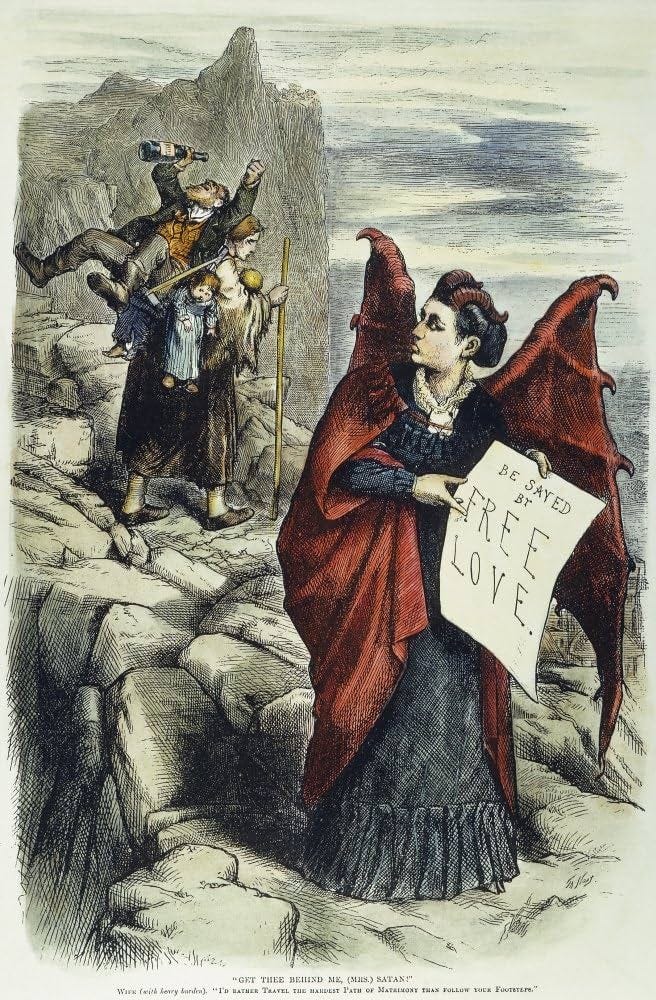
Getting a divorce in the 1850s came with a great deal of stigma no matter the reason, and her experiences from this led Woodhull to become an advocate of the free love movement. Teri Finneman, associate professor in the School of Journalism and Mass Communications at the University of Kansas and author of the book Press Portrayals of Women Politicians, 1870s-2000s stated that Woodhull “felt it was really unfair that men could go around and have affairs. It was considered just part of society, while women had no other choices.” The idea of free love was to destigmatize divorce and to give women back agency in their decision about who they chose to sleep with and how long they wanted to remain with that partner. Woodhull didn’t want women to be trapped in marriages where they were abused. In her speech, “And the Truth Shall Make You Free: A Speech on the Principles of Social Freedom,” Woodhull explained
Yes, I am a free lover. I have an inalienable, constitutional and natural right to love whom I may, to love as long or as short a period as I can; to change that love every day if I please, and with that right neither you nor any law you can frame have any right to interfere. And I have the further right to demand a free and unrestricted exercise of that right, and it is your duty not only to accord it, but as a community, to see I am protected in it. I trust that I am fully understood, for I mean just that, and nothing else.
While on the road, Woodhull and her sister were hired by the railroad magnate Cornelius Vanderbilt, who wanted their help to contact his dead wife. In exchange, he shared financial advice, and the sisters became very rich. They used their savings to start a brokerage, which they named Woodhull, Claflin, and Company, and they became the first women to operate a financial firm on Wall Street. The press loved the novelty of the sisters and dubbed them “the Bewitching Brokers” and the “Queens of Finance.” With wealth and now the eye of the press aimed at them, Woodhull used her spotlight to try and improve women’s rights. She and her sister began publishing Woodhull and Claflin’s Weekly, a newspaper that supported free love, women’s suffrage, and other progressive political reforms. Woodhull also became deeply involved in the women’s suffrage movement in 1869, and her success as a public speaker on behalf of the cause led her to take on prominent roles at suffrage conventions in the next few years.
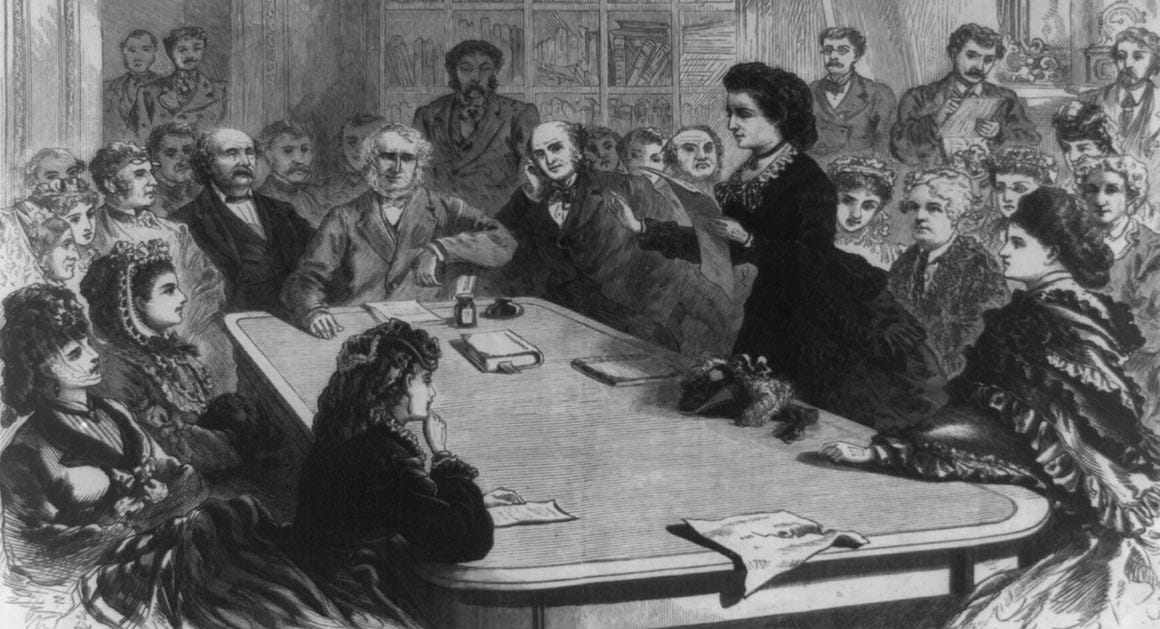
In 1871, she made history when she became the first woman to testify before a committee of the U.S. House of Representatives. She stood with suffragists Susan B. Anthony and Isabella Beecher Hooker in front of the House Judiciary Committee, arguing that American women already possessed the right to vote under the 14th and 15th Amendments, and called on them to draft legislation that clarified women’s right to vote. Though she was a convincing speaker, her words were not strong enough to change the minds of a roomful of men. Her defeat in that room led her to take more drastic measures. In 1872, she decided to run for president under the new Equal Rights Party. As she stated:
“While others argued the equality of woman with man, I proved it by successfully engaging in business; while others sought to show that there was no valid reason why woman should be treated socially and politically as a being inferior to man, I boldly entered the arena of politics and business and exercised the rights I already possessed.”
There were a number of reasons why her presidential campaign could have been taken more seriously by the public, including the fact that she was six months shy of turning 35, the minimum age to assume the presidency. But the sheer fact that Woodhull ran at a time when women didn’t even possess the right to vote seems incredible.
Eventually, Woodhull would butt heads with the suffragists. They soon veered away from her ideas about free love. But, her ideas that people should be able to love whom they wish when they wish would set the groundwork for future changes.
For more information about women who have run for president, visit this site.
My book, Riding Like the Wind: The Life of Sanora Babb, has a new cover! Stay tuned for my book tour venues and dates.


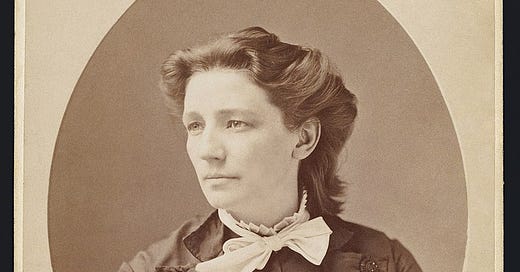



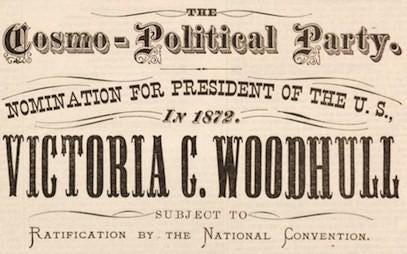

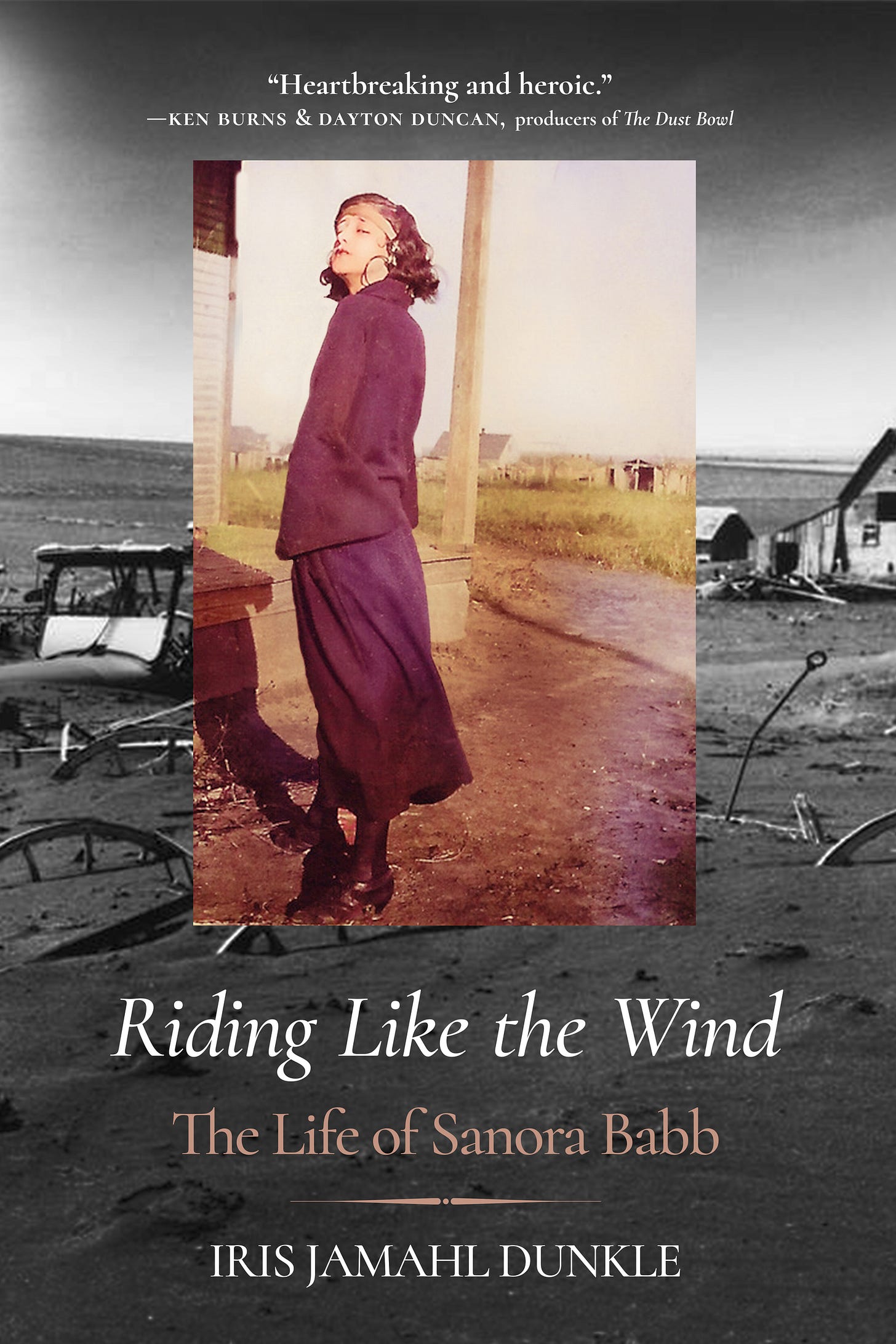
What an amazing story! Enthralled by the highs and lows
Great to hear about this , Iris, thank you! Inspiring to us all. I also was a successful businesswoman, and have always felt equal to or better than the competition. I only wish I could have told fortunes and sold cures along the way.